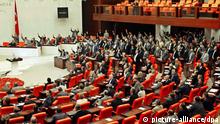Turkish Prime Minister Erdogan has opened a debate about reintroducing the death penalty in Turkey - probably with an eye on the presidential elections in 2014.
According to the Turkish Prime Minister Recep Tayyip Erdogan, it was the "very mild sentencing" of the Norwegian right-wing terrorist Anders Bering Breivik which triggered the initiative. How could it be possible that someone who had murdered 77 people should have to serve only 21 years in prison, Erdogan asked during an early November visit to Indonesia. He pointed out that countries such as the US, Japan and China continue to apply the death penalty - and that Turkey ought to reconsider its stance.
 Erdogan told Merkel that Turkey wants to join the EU
Erdogan told Merkel that Turkey wants to join the EU
Upon his return to Ankara, Erdogan repeated his statement, causing confusion among both his supporters and the opposition. After all, it was only at the end of October during a visit to Berlin that he todl the German chancellor, Angela Merkel, that Turkey still had a strong interest in becoming a member of the EU. But that would be impossible should Turkey reintroduce the death penalty, as he himself must know.
Attempts of justification
The prime minister's unexpected comments have forced supporters in the cabinet and his ruling AKP party to try to explain him more or less convincingly. Foreign Minister Ahmet Davutoglu said that he had merely been upset about the Breivik case. From within the AKP came the comment that Erdogan's intention had been to make an appeal to the EU to reconsider whether it was wise to reject the death penalty so completely in the face of the Breivik murders.
 The press welcomed the abolition of the death penalty in 2002
The press welcomed the abolition of the death penalty in 2002
So far, though, there hasn't been any attempt to draw up a draft law that would lead to Erdogan's proposal being put into effect. Minister of Justice Sadullah Ergin told parliament that the abolition of the death in 2002 and the subsequent amendment to the constitution two years later were both the result of an initiative by the Erdogan administration. Ergin said there was currently no work being done in his ministry to change either the law or the constitution back again.
Eyes fixed on nationalist voters
So has Erdogan taken a wrong turn? Most observers in Ankara are sure that the prime minister, who is considered to be a careful strategist, will have brought up the topic for a reason, and Mehmet Bekaroglu, a former member of parliament, thinks he knows what it is. He told the Evrensel newspaper that Erdogan wants the support of right wing nationalist voters in the 2014 presidential elections.
It's an open secret that the prime minister has aspirations to the presidency. And since most voters in Turkey are center-right, they form the group that is of most relevance to any presidential hopeful. Courting the nationalists, from Erdogan's view, may therefore be the right thing to do.
Nationalists try to nail Erdogan down
In Turkey, the death penalty is mostly discussed in connection with the jailed Kurdish rebel commander Abdullah Öcalan. Öcalan's 1999 death sentence was commuted to life imprisonment when the death penalty was abolished in 2002. The nationalist MHP party now says that Erdogan wants to win back the support of those right-wing voters he alienated by supporting peace talks between the state and Öcalan's PKK rebels. Those talks were suspended in 2011, but, according to Erdogan, they could still be resumed.
 The MHP largely backed Erdogan over the 2002 reform
The MHP largely backed Erdogan over the 2002 reform
The MHP now aims to expose Erdogan's statements as mere tactical maneuvers. The head of the MHP, Devlet Bahceli, has called on the prime minister to come up with a draft law for the death penalty, which his party would then support.
However, it is unlikely that Erdogan will play along with this. He doesn't seem to be too worried about nationalist accusations of hypocrisy. After all, he can embarrass the MHP by pointing out that Bahceli and his party were part of the ruling coalition which abolished the death penalty in 2002. DW DE

No comments:
Post a Comment